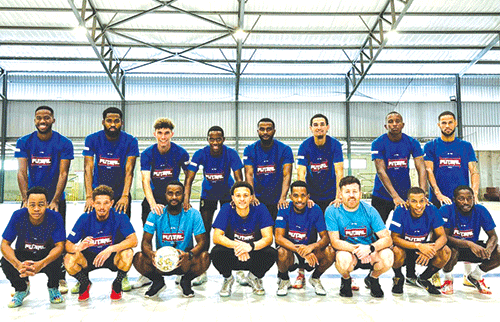Can you tell us about your coaching journey?
I started coaching in 2014, I played for Invincible FC, and we needed someone to help with coaching. So, I coached, and I immediately fell in love with the idea.
What inspired you to pursue coaching, particularly in futsal?
The trust to run the football club, Invincible FC, inspired me. With Futsal, I played for Ballers FC, which we started as friends for a few months, and decided that I would best help the team with coaching.
Did you have any experience playing football or futsal yourself?
I’ve been playing football all my life, up until futsal started in Namibia.
How did your playing career, if any, influence your coaching style?
Positively, I was a typical winger who could run and finish any chance I got in front of goal.
Qualifying for the African Cup of Nations is a significant achievement. Could you walk us through the challenges your team faced during the qualifiers?
We faced a few challenges for our home game, which were quickly fixed by our chairman Andrei Tirtirau and vice chairman Absai Simon, together with support from the team they assigned, the NFA, and sponsors. The boys were well taken care of. The away game was a different story; the same treatment we gave them here in Namibia was not reciprocated in Tanzania. The team knew that we only had one objective going there, and that was to qualify for the Afcon, no matter how hostile the conditions would be.
Losing at home during the qualifiers must have been disappointing. How did you motivate your team to bounce back and secure a crucial win away in Tanzania?
I kept motivating them, reminding them that the game was not over until the second leg was done, that they should play Futsal with joy and the way they knew it, and that I believed in them, and that they could overturn the result. Importantly, the BRAVE in our national anthem speaks for us as a nation that we are brave in all that we do, and can achieve anything we are faced with.
What were the key strategies or adjustments you made between the home and away matches to secure the win in Tanzania?
Our focus was mainly on finishing, and when to add substitutions at the right moments.
Qualifying for the Afcon finals is undoubtedly a momentous achievement for Namibian futsal. How did it feel when you realised your team had secured qualification?
It was mind-blowing. Up until today, I still can not take it in.
Did you always believe your team could turn the results around after the initial setback at home?
Yes, I knew it. I watched the game more than 10 times, and saw what was needed to get the result.
Looking ahead to the Afcon finals, what are your expectations for the team? Are there any specific goals you’ve set?
The team must be in a position where it can compete without any issues, as well as for the nation to support the futsal team, and the association to get investments from all and any willing sponsors. Our goal is to compete, not participate.
How do you plan to prepare the team for the upcoming tournament?
Have an intensive training schedule for the boys to be able to compete at that level, and analyse the teams which went through.
Are there any areas you feel need improvement before the finals?
The Futsal Association needs to get more funding to ensure the team is well-prepared. We must get international friendly games, and all this costs money.
On a personal level, what does qualifying for the Afcon finals mean to you as a coach?
How do you plan to approach this opportunity?
It changed my life, as this has added value to me in every way possible. This will open doors to coaching in Futsal, Namibia, and provide growth opportunities.


